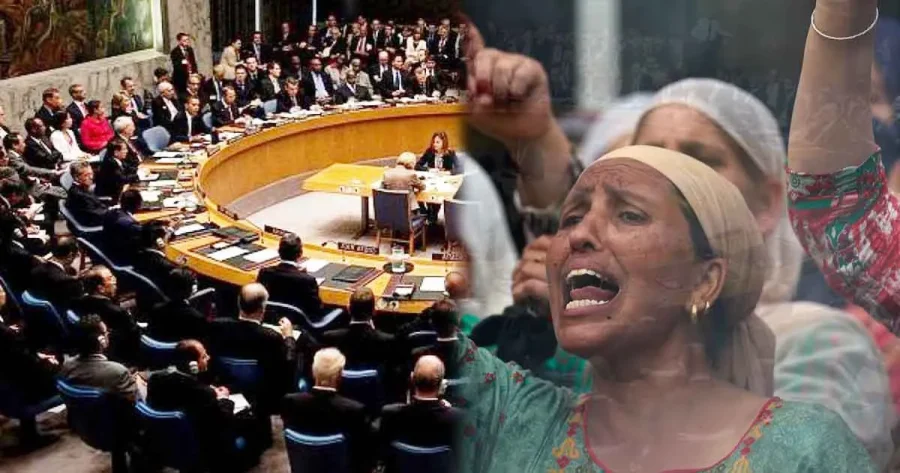The UN Special Rapporteur on Human Rights Defenders and other UN experts have expressed their serious concern at the arrest, detention and accusations brought against Kashmiri human rights defenders Irfan Mehraj and Khurram Parvez, which they said are “designed to delegitimize their human rights work and obstruct monitoring of the human rights situation in” Indian occupied Jammu and Kashmir
A joint communication released by the UN Special Rapporteur on Human Rights Defenders and other UN experts, and which is available at the website of the UN Special Rapporteur on Human Rights Defenders, said , “We underline the legitimacy of their work and of the activities of the JKCSS and express our fear that the arrest and detention of Mr. Mehraj, as well as the continued detention of Mr. Parvez since 2021 and his involvement in the second case at hand, are designed to delegitimize their human rights work and obstruct monitoring of the human rights situation in India-administered Jammu and Kashmir.
“As we have repeatedly stressed in the past, counter-terrorism legislation should never be used to sanction human rights defenders. We express our abhorrence at the continued instrumentalization of national-security measures and discourse to undermine, obstruct and persecute those peacefully promoting, defending and seeking the advancement of human rights in the country, as well as to frustrate accountability for human rights violations.”
Disagreeing with the definition of a terrorist by the Modi government, the joint communication said, “As we previously raised in OL IND 7/2020, we are deeply concerned about the definition of ‘terrorist act’ in the UAPA, which substantially departs from the model definition offered by the Special Rapporteur on the promotion and protection of human rights and fundamental freedoms while countering terrorism and provides broad powers to the executive, without oversight or control from the judiciary. We further remind your Excellency Government that the definition of terrorism and terrorism offences must be ‘genuinely’ terrorist in nature in accordance with the elements identified by the Security Council in its resolution 1566 (2004).”
The statement warned that “Conflation of hu-man rights work with terrorism is inconsistent with the obligations of State affirmed by the Security Council that counter-terrorism activities by States should not conflict with other international law obligations, particularly human rights, and with the agreed consensus of Member States contained in the Global Counter-Terrorism strategy opposing the misuse of counter-terrorism measures against civil society (A/RES/60/288).”
“We also note our deep concerns about allega-tion of ‘terror funding’ and highlight that the Financial Action Task Force (FATF) has set forth international practices and guidelines aimed at preventing global money laundering and terrorist financing. The FATF recommendations, while non-binding, provide recognized international guidance for the countering of terrorism financing. Recommendation (1) states that ‘countries should apply a risk-based approach (RBA) to ensure that measures to prevent or mitigate money laundering and terrorist financing are commensurate with the risks identified’ Rec-ommendation (8) provides guidance to States on the laws and regulations that should be adopted to oversee and protect NPOs that have been identified as being vulnerable to terrorist financing concerns.”
“Such measures must be ‘focused and propor-tionate’; ‘ ‘one size fits all’ approach to address all NPOs is not appropriate.’ FATF has reaffirmed that State compliance with Recommendation (8) and the other FATF Recommendations ‘should not contravene a country’s obligations under the Charter of the United Nations and international human rights law to promote universal respect for, and observance of, fundamental human rights and freedoms, such as freedom of expression, religion or belief and freedom of peaceful assembly and of association.”
Blaming India for targeting civil society, the joint statement said, “We are concerned that these arrests appear to contravene a “risk-based” approach to countering terrorism finance and appear to demonstrate a misuse of countering terrorism finance laws and practice to disproportionately target civil society.”
It is worth mentioning here that the “communication written by the UN Special Rapporteur on Human Rights Defenders and other UN experts to the Government of India on 5 June 2023. The communication remained confidential for 60 days before being made public, giving the Government time to reply. Regrettably, the Government did not reply within this time frame.”
The communication stated that “If a reply is received it will be posted on the UN Special Procedures communications database”.
“Since the communication was sent, the deten-tion of Mr. Mehraj and Mr. Parvez has twice been extended following petitions by the National Investigation Agency (NIA), with the latest extension granted on 27 July 2023. Both human rights defenders remain detained in Rohini Prison in Delhi”.—KMS









